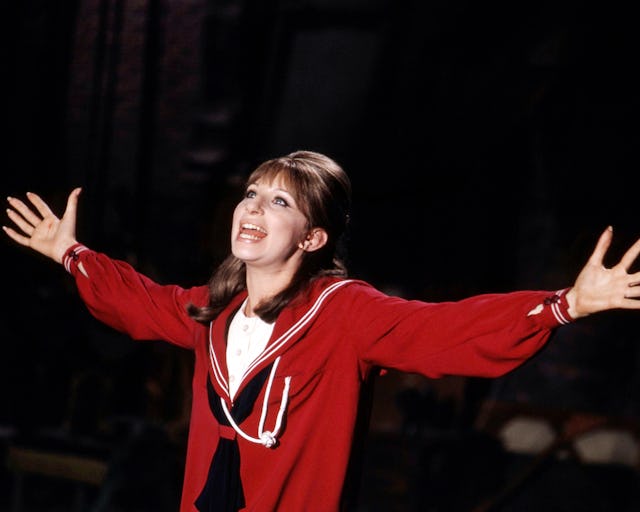55 Years Later, Funny Girl’s Fanny Brice Is Cinema’s Most Underrated Female Protagonist
I said what I said.

There are a few select movies from my childhood that will forever hold a very special place in my heart. But the one that stands out most in my mind is the Barbra Steisand-led musical production of Funny Girl, which follows the life and career of Broadway star Fanny Brice and her spectacular rise to stardom. There’s love, there’s romance, there’s a ton of fantastic musical numbers. It’s little wonder the film went on to receive a whopping eight Academy Award nominations.
The film came out back on September 18, 1968, which, to be clear, is nearly two decades before I was even born (let’s not make me any older than I already am, thank you very much). So, why was a ‘90s child so emotionally invested in a ‘60s film, you might ask? Well, for starters, it was one of my mom’s favorite movies, and we always had a great time watching it together. Every so often, we’d just get in the mood to watch it, make some popcorn, and sing along to all of our favorite numbers. It was a special time set aside for just the two of us — something that I’ve come to treasure more and more over the years.
Yet that wasn’t the only reason I’ve always felt such a close kinship with this film. To me, Fanny Brice is an underrated feminist icon who has never really received the credit she deserves. But now, on the brink of Funny Girl’s 55th anniversary, it’s time to give Streisand’s character her just rewards.
Admittedly, many works of cinema haven’t held up to the test of time, and throughout the years, Funny Girl has received its fair share of criticism from viewers. A quick Google search will show you that one of the biggest complaints about the film centers around Fanny’s love life, particularly when it comes to her main love interest, Nicky Arnstein (Omar Sharif). Many found the romance disappointing and felt that it reduced Fanny to nothing more than a lovesick girl willing to give up everything she had worked so hard for to marry a handsome man.
To an extent, I can see where the frustration is coming from. Here was a woman on her way to becoming a huge Broadway success — the epitome of everything she had ever dreamed of. However, after spending some time with Nick, she realizes how much she loves him and decides to halt going on tour to go see him, which culminates in them getting married. But does that decision automatically make her not a feminist? I tend to disagree.
Personally, I never viewed this as Fanny choosing a man over her career. In fact, I admired Fanny’s tenacity to always go after what she wanted — something she’d continuously done throughout her life long before Nicky Arnstein ever came on her radar.
She wanted to be a Broadway star, and she made that happen despite everyone in her life telling her it wasn’t going to happen. They called her a chorus girl with skinny legs and didn’t think she fit the “typical beauty standards” society expected of all women. In short, they didn’t believe in her. But she believed in herself. The level of confidence she had in herself as both a singer and performer was downright admirable. She knew her worth, and that ambition and self-assuredness made her the success she became.
When she felt uncomfortable with a scene for one of Mr. Zeigfield’s productions, she changed the storyline so that the audience would laugh with her, not at her. She had been told not to change it and knew doing so could get her fired, but she felt passionate enough about it that she decided to do it anyway, and boom — the audience loved it. So, isn’t her pursuit of Nick just another example of her ambition to go after what she wants, both personally and professionally?
When Fanny starts singing “Don’t Rain On My Parade,” it’s because she once again feels like others are trying to dictate how her life should go. But she demands to be the one in control of her decisions, which is always a refreshing message to send to women of all ages.
So, you see, this isn’t a song of defeat where her dreams no longer matter. It’s an anthem declaring that she wants this man, he makes her happy, and nothing and no one is getting in her way. And let’s not forget, she went back to her career not too long after getting married. She was simply prioritizing her personal life when she needed it most and trying to find a healthy work-life balance. That’s not silly or trivial. That’s brave.
And yes, their marriage ultimately ended due to Nick’s skewed, outdated views on gender roles and who should or shouldn’t be the main breadwinner of a family. But that’s his own insecurities he needs to grapple with. And if you think Fanny let him off too easy for all the hurt and heartbreak, she puts him in his place in the film’s sequel, Funny Lady.
Time and time again throughout the film, Fanny showcased the types of qualities all women deserve to feel: confidence, determination, stubbornness, ambition, and yes, even sometimes lovesickness. To me, as a young girl, she was the whole package — someone I really looked up to as a role model. And now that legendary icons like Barbie are finally getting the recognition they deserve, I say it’s high time we give Fanny some of that love as well.